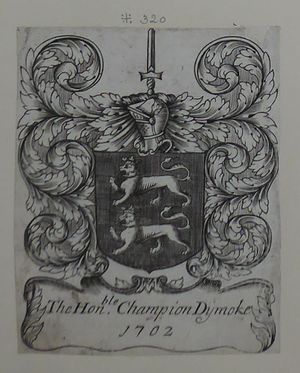Difference between revisions of "Charles Dymoke 1667-1703"
From Book Owners Online
m (David moved page Charles Dymoke to Charles Dymoke 1667-1703 without leaving a redirect) |
|||
| (2 intermediate revisions by the same user not shown) | |||
| Line 1: | Line 1: | ||
__NOTITLE__ | __NOTITLE__ | ||
===[[name::Charles]] [[name::DYMOKE]] [[date of birth::1667]]-[[date of death::1703]]=== | ===[[name::Charles]] [[name::DYMOKE]] [[date of birth::1667]]-[[date of death::1703]]=== | ||
| − | + | [[file:P1120449(2).JPG|thumb|Charles Dymoke's bookplate (British Museum Franks Collection *320)]] | |
====Biographical Note==== | ====Biographical Note==== | ||
Son of Sir [[family::Charles Dymoke]] of [[location::Scrivelsby, Lincolnshire]], members of a gentry family long established there and which continues to the present day. Successive members of the family have held the title of [[personal title::King's Champion]] since the late 14th century; it is now a ceremonial role at coronations. MA [[education::Magdalene College, Cambridge]] 1682. [[occupation::MP]] for [[location::Lincolnshire]] 1698-1703. | Son of Sir [[family::Charles Dymoke]] of [[location::Scrivelsby, Lincolnshire]], members of a gentry family long established there and which continues to the present day. Successive members of the family have held the title of [[personal title::King's Champion]] since the late 14th century; it is now a ceremonial role at coronations. MA [[education::Magdalene College, Cambridge]] 1682. [[occupation::MP]] for [[location::Lincolnshire]] 1698-1703. | ||
====Characteristic Markings==== | ====Characteristic Markings==== | ||
| − | Dymoke used an engraved armorial bookplate dated 1702, though the extent of his library (some of which is likely to have been part of a multi-generational family one) is unknown. His will has no explicit mention of books. | + | Dymoke used an engraved armorial bookplate dated 1702 (Franks *320), though the extent of his library (some of which is likely to have been part of a multi-generational family one) is unknown. His will has no explicit mention of books. |
====Sources==== | ====Sources==== | ||
| Line 12: | Line 12: | ||
*[https://discovery.nationalarchives.gov.uk/details/r/D669114 Will of Charles Dymoke, The National Archives PROB 11/470/105]. | *[https://discovery.nationalarchives.gov.uk/details/r/D669114 Will of Charles Dymoke, The National Archives PROB 11/470/105]. | ||
*[http://www.historyofparliamentonline.org/volume/1690-1715/member/dymoke-charles-1667-1703 History of Parliament]. | *[http://www.historyofparliamentonline.org/volume/1690-1715/member/dymoke-charles-1667-1703 History of Parliament]. | ||
| − | *Gambier Howe, E. R. J. ''Franks bequest: catalogue of British and American book plates bequeathed to the ... British Museum''. London, 1903 | + | *Gambier Howe, E. R. J. ''Franks bequest: catalogue of British and American book plates bequeathed to the ... British Museum''. London, 1903. |
</div> | </div> | ||
| Line 19: | Line 19: | ||
[[Category:Members of Parliament]] | [[Category:Members of Parliament]] | ||
[[Category:Bookplates and Labels]] | [[Category:Bookplates and Labels]] | ||
| + | [[Category:All Owners]] | ||
Latest revision as of 09:23, 6 August 2021
Charles DYMOKE 1667-1703
Biographical Note
Son of Sir Charles Dymoke of Scrivelsby, Lincolnshire, members of a gentry family long established there and which continues to the present day. Successive members of the family have held the title of King's Champion since the late 14th century; it is now a ceremonial role at coronations. MA Magdalene College, Cambridge 1682. MP for Lincolnshire 1698-1703.
Characteristic Markings
Dymoke used an engraved armorial bookplate dated 1702 (Franks *320), though the extent of his library (some of which is likely to have been part of a multi-generational family one) is unknown. His will has no explicit mention of books.
Sources
- Will of Charles Dymoke, The National Archives PROB 11/470/105.
- History of Parliament.
- Gambier Howe, E. R. J. Franks bequest: catalogue of British and American book plates bequeathed to the ... British Museum. London, 1903.
